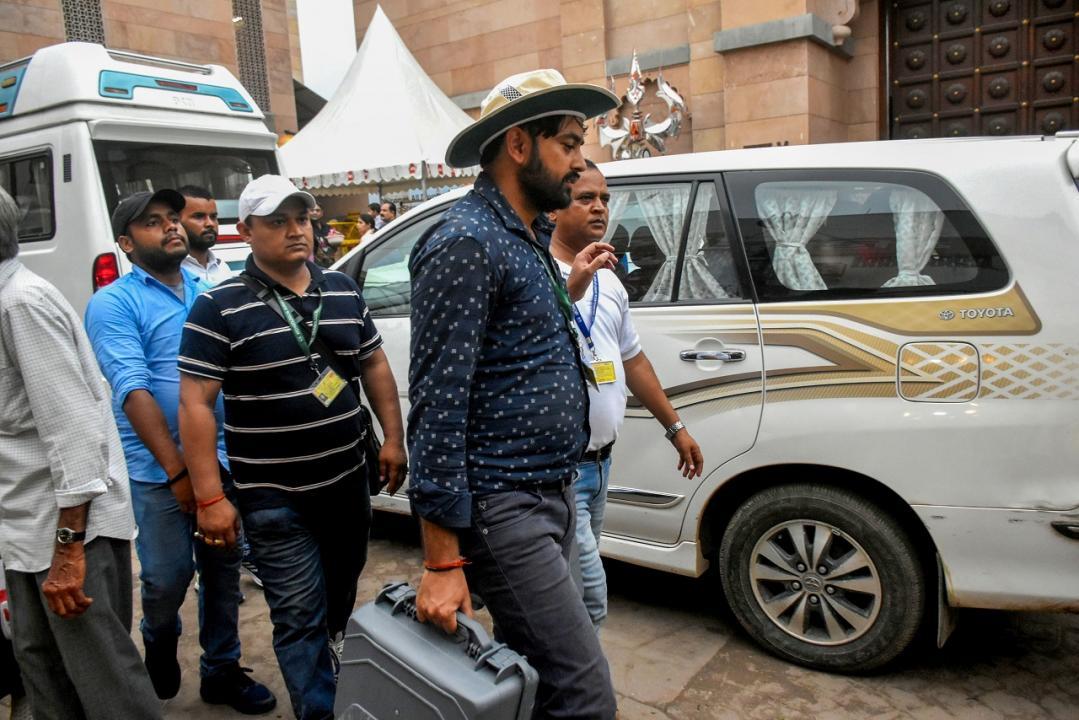The Supreme Court on Friday refused to stay the Allahabad High Court order on the ASI survey of the Gyanvapi mosque, an exercise that the Muslim side says will "reopen wounds of the past"

Pic/PTI
The Archaeological Survey of India (ASI) on Saturday resumed its scientific survey work at the Gyanvapi mosque in Varanasi to determine whether the 17th-century mosque was constructed over a pre-existing structure of a Hindu temple, reported news agency PTI.
ADVERTISEMENT
Government counsel Rajesh Mishra, who accompanied the ASI survey team during the day-long exercise a day before, on Saturday said the team started work in the morning and it would end at 5 pm, reported PTI.
The Supreme Court on Friday refused to stay the Allahabad High Court order on the ASI survey of the Gyanvapi mosque, an exercise that the Muslim side says will "reopen wounds of the past".
The bench of Chief Justice D Y Chandrachud and Justices J B Pardiwala and Manoj Misra, however, asked the Archaeological Survey of India not to carry out any invasive act during the survey to find out if the 17the century mosque was built on a Hindu temple.
This ruled out excavations, which the Varanasi court had said can be conducted if necessary.
The Supreme Court nod came just hours after an ASI team had already resumed the "detailed scientific survey" ordered by the Varanasi district court on July 21.
The Anjuman Intezamia Masjid committee had challenged the district court's order in the Allahabad High Court, which dismissed its petition on Thursday. The Muslim body then quickly approached the Supreme Court.
On Friday, the Varanasi court also granted the ASI an additional month to complete the survey, extending its original deadline from Friday to September 4.
In the Supreme Court, the bench took note of an assurance by Solicitor General Tushar Mehta, appearing for the ASI and the Uttar Pradesh government.
"It is clarified on behalf of the ASI, represented by the solicitor general, that as a matter of fact, the entire survey will be completed without any excavation at the site and without causing any destruction to the structure," the bench said.
The top court said the evidentiary value of the survey by the ASI was open to be tested in the lawsuit and to objections, including cross-examination.
Consequently, the report of the ASI, by itself, does not amount to determination of the matters in dispute, it said.
"Having regard to the nature and ambit of Court-appointed commissioners, we are unable to differ with the view of the High Court...," it said.
Senior advocate Huzefa Ahmadi, appearing for the mosque management committee, argued that the ASI survey violated the Places of Worship (Special Provisions) Act, 1991 which prohibited changing the character of religious places as they existed in 1947.
"The ASI survey intends to go into history as to what happened 500 years ago. It would reopen wounds of the past," he said.
In Varanasi, the ASI team began work at 7 am, pausing at 12 pm for a couple of hours for the Friday namaz, according to a lawyer from the Hindu side. The day's work ended at 5 pm.
Government counsel Rajesh Mishra, who too accompanied the team said the ASI took photographs and mapped the complex during the day-long exercise Friday.
(With inputs from PTI)
 Subscribe today by clicking the link and stay updated with the latest news!" Click here!
Subscribe today by clicking the link and stay updated with the latest news!" Click here!







